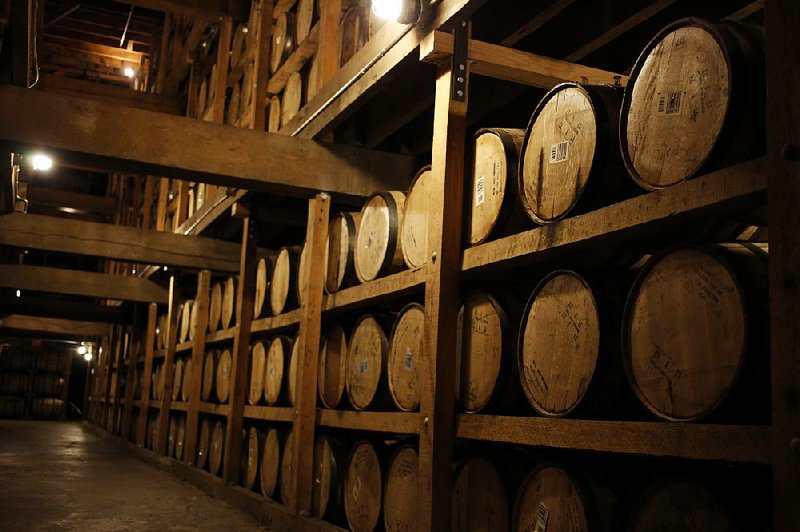A year-long fight among state legislators over the definition of true Tennessee whiskey is spilling over to the international distilled spirits business, dividing both Tennessee’s powerful whiskey interests and multinational corporations battling for billions of dollars in global market share.
For more than a century, distillers across Tennessee have produced whiskey - some legally, some illegally - using a variety of base products such as corn, barley or rye and a number of different techniques.
But under a new law passed by the legislature last year, only one process would lead to genuine Tennessee whiskey: a drink made of fermented mash made up of at least 51 percent corn, aged in new barrels of charred oak, filtered through charcoal and bottled at 40 percent alcohol or higher by volume.
Last week, two Tennessee legislative committees voted to delay consideration of a proposal to roll back some of those requirements. The disagreement centers on the process by which Tennessee whiskey is distilled and whether a producer has to use pricey new oak barrels every year.
Current law requires that new barrels be used. The bill up for debate, proposed by state Rep. Bill Sanderson, would allow whiskey makers to ferment their products in reused barrels, a process far less expensive than one that requires buying new barrels of expensive American oak year after year.
Supporters of the 2013 law said it was necessary to codify what the industry calls standards of identity, a concrete definition of what makes Tennessee whiskey special - and different from other, lower-quality spirits. But opponents say the law effectively codifies Jack Daniel’s formula.
“Any place that producesa product, in this case we’re talking about distilled spirits, that has a particular premium to it or particular ways you will make it, has standards to entry,” said Phil Lynch, a spokesman for Brown-Forman, the owner of Jack Daniel’s, Tennessee’s largest whiskey producer. “The standards of identity for Tennessee whiskey are the same that they’ve been, [the legislature had] just never codified them.”
Bourbon, like other spirits that enjoy federal standards of identity, is held to stricter requirements than mere whiskey. A federal law passed a half century ago requires that only beverages of fermented mash of at least 51 percent corn, not exceeding 160 proof - or 80 percent alcohol by volume - produced in the United States and not for export be allowed to call themselves bourbon.
Codifying similar rules for Tennessee whiskey, they say, will protect the industry from low-quality producers who want to create their own product on the cheap.
But others who want thestandards imposed by the Tennessee legislature rolled back see another motive behind the 2013 law: The process codified in state law sounds remarkably like the recipe used by Brown-Forman.
“This is all about my rights. And when you take away any of my rights, I’m going to fight you tooth and nail on it,” said Phil Pritchard, owner of Pritchard’s Distillery in Kelso, Tenn. “Last year, a lot of those rights got taken away from me through a process that was abetted by an employee of Jack Daniel’s for the benefit of Jack Daniel’s.”
Jeff Arnett, Jack Daniel’s master distiller, has been lobbying members of the legislature to keep the 2013 law in place.
Nearly 20 other distilleries in Tennessee, the first of which only began receiving licenses in 2009, cannot legally call their product Tennessee whiskey without both new barrels and charcoal filtering.
The 2013 rule defining Tennessee whiskey concerns another major player in the distilled spirits industry: Diageo, the London-based parent company of brands including Smirnoff vodka, Baileys and Guinness. Diageo has two products in the mix: George Dickel, the second-largest producer of Tennessee whiskey, with its headquarters just a few miles up the road from Jack Daniel’s, and Johnnie Walker, the best-selling blended Scotch whisky.
“We don’t think there should be a law that says this is how we, or anyone else, have to make whiskey,” John Lunn, George Dickel’s master distiller, said in a statement. Diageo North America Executive Vice President Guy Smith said the current law “creates an anti-competitive situation that will stifle innovation from skilled Tennessean distillers, both large and small.”
Distillers across Tennessee are concerned the year-old rules will prevent them from producing as much whiskeyas they could because of a shortage of the new oak barrels. A rainy year in 2013 saturated oak across the eastern United States and made harvesting wood more difficult.
Business, Pages 80 on 03/23/2014

